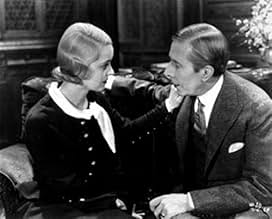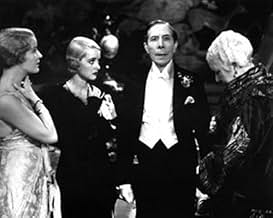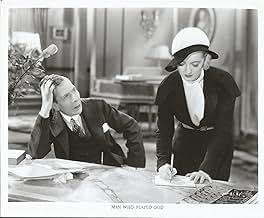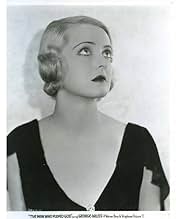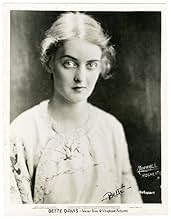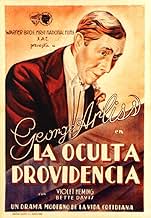AVALIAÇÃO DA IMDb
6,8/10
1,4 mil
SUA AVALIAÇÃO
Adicionar um enredo no seu idiomaAfter losing his hearing, a musician uses lip-reading to help others.After losing his hearing, a musician uses lip-reading to help others.After losing his hearing, a musician uses lip-reading to help others.
- Direção
- Roteiristas
- Artistas
- Prêmios
- 1 vitória no total
George Arliss
- Montgomery Royle
- (as Mr. George Arliss)
André Luguet
- The King
- (as Andre Luguet)
Ivan F. Simpson
- Battle
- (as Ivan Simpson)
Charles E. Evans
- The Doctor
- (as Charles Evans)
Fred Howard
- Man
- (cenas deletadas)
Symona Boniface
- Woman in Audience
- (não creditado)
Wade Boteler
- Detective
- (não creditado)
Elspeth Dudgeon
- Would-Be Ticket Buyer
- (não creditado)
Grace Durkin
- Kit - First Girl
- (não creditado)
Helena Phillips Evans
- Music Fan with Boy
- (não creditado)
Avaliações em destaque
An aging & celebrated concert pianist completely loses his hearing, and with it his faith in The Almighty. After learning to lip read, he realizes he can once again enter into people's lives, alleviating the misfortunes of total strangers. With this much power to do good, he becomes THE MAN WHO PLAYED GOD.
Although sadly neglected today, George Arliss was one of the very greatest of film actors of the 1930's. His art was consummate - a whole volume of emotion could be conveyed by the slightest movement of face or posture. He gives a wonderful performance here as a man torn from what he loves the most, blaming God for it and eventually finding peace.
A splendid actress of the same period, Louise Closser Hale gives quiet dignity to the role of Arliss' sister. As his protégé, young Bette Davis does a fine job; she always considered this to be her first film role of substance. Ivan F. Simpson is excellent as a very loyal butler. Hedda Hopper has a tiny role as a woman at a picnic & look for an uncredited Ray Milland as a young man in Central Park attempting suicide.
Although sadly neglected today, George Arliss was one of the very greatest of film actors of the 1930's. His art was consummate - a whole volume of emotion could be conveyed by the slightest movement of face or posture. He gives a wonderful performance here as a man torn from what he loves the most, blaming God for it and eventually finding peace.
A splendid actress of the same period, Louise Closser Hale gives quiet dignity to the role of Arliss' sister. As his protégé, young Bette Davis does a fine job; she always considered this to be her first film role of substance. Ivan F. Simpson is excellent as a very loyal butler. Hedda Hopper has a tiny role as a woman at a picnic & look for an uncredited Ray Milland as a young man in Central Park attempting suicide.
In 1932 many actors were still rather new to sound pictures and the great majority of them were theatre trained and while some would stay on in Hollywood, many would return to the stage to stay. Bette Davis was a young actress in the midst of making that decision to aty in Hollywood or return to New York and the stage. She had made several low buget pictures, but things just were not clicking for her. The success of this movie and the attention she received convinced her to stay on and make movies and we are all thankful for that. George Arliss was a grand old man of the stage and his artistry is well portrayed here. His makeup is a little heavy, making him look a little like the Phantom of The Opera with lipstick and darkened nostrils, but soon you get beyond that. The acting is almost strictly stage-style here, this MUST have been a play before it was filmed. The blocking and angles of the actors and the way they seem to talk "at" each other rather than to each other shows the stage acting. Great story, nice escapism... who wouldnt like to help others? We can do that through George Arliss in this movie.
Although George Arliss made several of the roles he did on stage into films both sound and silent The Man Who Played God was not one of them. Another stage legend Otis Skinner originated that role on Broadway although Arliss filmed it twice both as a silent and with sound.
We can only speculate about what Skinner did with the part, but Arliss because we have him on film can truly be said to make the part his own. His is a style that many find old fashioned, but I find most compelling when he's performing.
The story is that of a famous concert pianist who was born into a wealthy family so he's never in danger of missing a meal. A bomb set off at a private performance has left him stone deaf and in a great deal of despair. But he learns the art of lip reading and from his Central Park penthouse with opera glasses in hand spies on a lot of ordinary people and becomes their anonymous benefactor.
Bette Davis made her Warner Brothers debut and the first of two films with George Arliss. Davis who was not exactly shy about criticizing her colleagues had nothing but praise for this man. She credited him with being the first to realize the potential she had as an actress. She plays a student of his who mistakes romantic love for an admiration as an artist she feels. She's not given much to work with in the role, but she does far more than could be expected.
Louise Closser Hale as Arliss's sister and Ivan Simpson as his butler who has a wonderful scene preventing Arliss from suicide also stand out. Look also for Ray Milland in a small part as another man on the verge of suicide.
The Man Who Played God is old fashioned in its presentation, but still holds up well after 80 years.
We can only speculate about what Skinner did with the part, but Arliss because we have him on film can truly be said to make the part his own. His is a style that many find old fashioned, but I find most compelling when he's performing.
The story is that of a famous concert pianist who was born into a wealthy family so he's never in danger of missing a meal. A bomb set off at a private performance has left him stone deaf and in a great deal of despair. But he learns the art of lip reading and from his Central Park penthouse with opera glasses in hand spies on a lot of ordinary people and becomes their anonymous benefactor.
Bette Davis made her Warner Brothers debut and the first of two films with George Arliss. Davis who was not exactly shy about criticizing her colleagues had nothing but praise for this man. She credited him with being the first to realize the potential she had as an actress. She plays a student of his who mistakes romantic love for an admiration as an artist she feels. She's not given much to work with in the role, but she does far more than could be expected.
Louise Closser Hale as Arliss's sister and Ivan Simpson as his butler who has a wonderful scene preventing Arliss from suicide also stand out. Look also for Ray Milland in a small part as another man on the verge of suicide.
The Man Who Played God is old fashioned in its presentation, but still holds up well after 80 years.
"Of Human Bondage," (1934) by RKO, to whom Bette Davis was 'loaned' by Warner Brothers, is most often given credit for the beginning of the Queen of the Silver Screen's magnificent acting career. That's not the historical fact, however; this movie, "The Man Who Played God," (1932) must be credited for bringing Bette Davis the recognition as an actor who could hold her own in the lead next to the great screen legend, George Arliss.
Davis was only 23 years of age when filming the show that earned her enough screen status for RKO to even desire her to play the leading, (dare I say) 'lady' next to leading man, Leslie Howard in "...Bondage." Arliss is to be credited for having, more or less, discovered Bette Davis; phoned her & the rest of her acclaimed acting career began.
So many of the critiquers repeat the myth that "... Bondage" is the film that made the world recognize how great an actor Davis was. But, if it was, RKO would have never even wanted her so badly that they 'got her on loan' from the Warners! RKO recognized the talent of Bette Davis in this film: "The Man Who Played God." So should we.
Never underestimate what young adult & teen women can achieve. After all, Mary Shelley wrote "Frankenstein," when she was only 19 years of age in a bet with great poets, Lord Byron & her husband Percy Bysche Shelley. Ann & Nancy Wilson of the rock band "Heart," composed many of their best songs when they were 13 years of age! Davis had already been on Broadway before taking her role in this movie. In fact, her acting career began when she was 15 (in 1923). Davis went on (& on!) to co-lead with Lillian Gish in "Whales of August," (1987), having been in over 100 movies; was the first woman to receive an Oscar at Warner Brothers (for "Dangerous"); the first person to be nominated for an Oscar 5 years in a row; the first woman to receive the AFI's Lifetime Achievement Award; the first person to be nominated for 10 Oscars; the highest paid woman during her prime. She was the epitome of a trail blazer who had to do it "the hard way."
Today, Robert Wagner, Miss Davis's son, Michael, & Miss Davis's closest assistant are key figures who keep Bette Davis's acting excellence alive, through the foundation named after her. Meryl Streep was the first actor to benefit from Davis's foundation. Obviously, the foundation board is taking Davis's acting acumen as a serious measure by which to select recipients of foundation awards & scholarships. Davis herself was the one to recognize Streep's acting abilities.
That's what kind of lady she was: she'd take a step back on the set to boost someone else's acting career; she'd take steps forward to seek out great scriptwriters, directors, cinematographers, etc. She strove to not only circulate her own gifts, but wanted to help others people do so with theirs--and still does so. Her reputation on the set was not as a "star," struck with ego maniacal lights in her fabulously expressive eyes. Instead, she was known to be a pleasure to work with amongst the team workers; and a real tough lady to contend with when she sensed something was amiss in a line, scene, lighting, direction, or co-worker. But, as Robert Wagner tells of Davis, she was truly a fun person to work with because she "always" came to work prepared to put on her very best performance. And when she goofed, she did so with a kind of cute humility that was full of wit enough to crack-up the co-workers she liked.
There's a huge difference between striving for perfection and believing we're perfect. Davis did the former. By the way, she gave her "Jezebel" Oscar to her son, Michael. Steven Spielberg bought her "Dangerous" one that was auctioned (for the second highest price ever) to benefit her foundation. This says to me that Davis herself knew she'd really earned her "Jezebel" Oscar; whereas it was no secret that the masses believed she got the "Dangerous" Oscar as a "consolation prize" for not even being nominated for, "Of Human Bondage."
By my standards, Davis was robbed of her third Oscar for playing the role of Charlotte Vale in "Now, Voyager." In Davis's mind, she was robbed of (what would have been her fourth) Oscar for playing Baby Jane Hudson in, "What Ever Happened to Baby Jane?"
Davis herself credited George Arliss & this movie for jump starting her into untouchable acting achievements. This movie is the movie to own if we want to say we've got a copy of Bette Davis's first great one.
Davis was only 23 years of age when filming the show that earned her enough screen status for RKO to even desire her to play the leading, (dare I say) 'lady' next to leading man, Leslie Howard in "...Bondage." Arliss is to be credited for having, more or less, discovered Bette Davis; phoned her & the rest of her acclaimed acting career began.
So many of the critiquers repeat the myth that "... Bondage" is the film that made the world recognize how great an actor Davis was. But, if it was, RKO would have never even wanted her so badly that they 'got her on loan' from the Warners! RKO recognized the talent of Bette Davis in this film: "The Man Who Played God." So should we.
Never underestimate what young adult & teen women can achieve. After all, Mary Shelley wrote "Frankenstein," when she was only 19 years of age in a bet with great poets, Lord Byron & her husband Percy Bysche Shelley. Ann & Nancy Wilson of the rock band "Heart," composed many of their best songs when they were 13 years of age! Davis had already been on Broadway before taking her role in this movie. In fact, her acting career began when she was 15 (in 1923). Davis went on (& on!) to co-lead with Lillian Gish in "Whales of August," (1987), having been in over 100 movies; was the first woman to receive an Oscar at Warner Brothers (for "Dangerous"); the first person to be nominated for an Oscar 5 years in a row; the first woman to receive the AFI's Lifetime Achievement Award; the first person to be nominated for 10 Oscars; the highest paid woman during her prime. She was the epitome of a trail blazer who had to do it "the hard way."
Today, Robert Wagner, Miss Davis's son, Michael, & Miss Davis's closest assistant are key figures who keep Bette Davis's acting excellence alive, through the foundation named after her. Meryl Streep was the first actor to benefit from Davis's foundation. Obviously, the foundation board is taking Davis's acting acumen as a serious measure by which to select recipients of foundation awards & scholarships. Davis herself was the one to recognize Streep's acting abilities.
That's what kind of lady she was: she'd take a step back on the set to boost someone else's acting career; she'd take steps forward to seek out great scriptwriters, directors, cinematographers, etc. She strove to not only circulate her own gifts, but wanted to help others people do so with theirs--and still does so. Her reputation on the set was not as a "star," struck with ego maniacal lights in her fabulously expressive eyes. Instead, she was known to be a pleasure to work with amongst the team workers; and a real tough lady to contend with when she sensed something was amiss in a line, scene, lighting, direction, or co-worker. But, as Robert Wagner tells of Davis, she was truly a fun person to work with because she "always" came to work prepared to put on her very best performance. And when she goofed, she did so with a kind of cute humility that was full of wit enough to crack-up the co-workers she liked.
There's a huge difference between striving for perfection and believing we're perfect. Davis did the former. By the way, she gave her "Jezebel" Oscar to her son, Michael. Steven Spielberg bought her "Dangerous" one that was auctioned (for the second highest price ever) to benefit her foundation. This says to me that Davis herself knew she'd really earned her "Jezebel" Oscar; whereas it was no secret that the masses believed she got the "Dangerous" Oscar as a "consolation prize" for not even being nominated for, "Of Human Bondage."
By my standards, Davis was robbed of her third Oscar for playing the role of Charlotte Vale in "Now, Voyager." In Davis's mind, she was robbed of (what would have been her fourth) Oscar for playing Baby Jane Hudson in, "What Ever Happened to Baby Jane?"
Davis herself credited George Arliss & this movie for jump starting her into untouchable acting achievements. This movie is the movie to own if we want to say we've got a copy of Bette Davis's first great one.
In "The Man Who Played God" the venerable George Arliss plays a famous and sweet-natured concert pianist who must cope with catastrophic hearing loss. There are two male-female romantic love subplots, but the story is essentially about philosophical and moral issues. The movie is best remembered not for Arliss, who was the main attraction, but for a supporting role beautifully played by the future screen queen Bette Davis, who for the most part is also very well photographed by James Van Trees, enhancing her unique presence. Amusingly, Mordaunt Hall of The New York Times in his review of the film faulted her for speaking "too rapidly for the microphone." But Arliss himself, as an artist suddenly forced to reconstruct his whole approach to life, is sympathetic and compelling despite the lipstick he habitually wore, in the style of many male actors of that time. He is ably supported by a thoroughly winning cast including Violet Heming, Ivan Simpson, Louise Closser Hale in an uncharacteristically non-dour role as the pianist's loving, intelligent and supportive sister, and even a very young Ray Milland as half of a distressed young couple whose desperate utterances are deciphered from afar by Arliss with the aid of binoculars and freshly acquired lip-reading skills. The studio-created ambiance of bustling city streets, whether "Paris" or "New York," is less phony looking than the usual replications thanks to careful lighting and well-planned camera angles.
Você sabia?
- CuriosidadesThis was the first movie Bette Davis made under her contract to Warner Bros., the studio under which she did most of her best-known work of the 1930s and '40s. Her earlier six films were made for various studios, (including Universal, RKO and Columbia) all of which let her go.
- Erros de gravaçãoWhen Royle goes to his desk after observing the couple in the park, the shadow of the boom microphone dips onto the window curtain behind him.
- Citações
Grace Blair: You're my ideal!
Montgomery Royle: I shall always be... your friend.
- ConexõesFeatured in Hollywood: The Great Stars (1963)
- Trilhas sonorasFantaisie-Impromptu in C sharp minor, Op. 66
(1834) (uncredited)
Written by Frédéric Chopin
Played on piano by George Arliss (dubbed by Salvatore Santaella) at the concert
Principais escolhas
Faça login para avaliar e ver a lista de recomendações personalizadas
Detalhes
- Data de lançamento
- País de origem
- Idiomas
- Também conhecido como
- The Man Who Played God
- Locações de filme
- Empresa de produção
- Consulte mais créditos da empresa na IMDbPro
Bilheteria
- Orçamento
- US$ 237.000 (estimativa)
- Tempo de duração1 hora 20 minutos
- Cor
- Mixagem de som
- Proporção
- 1.37 : 1
Contribua para esta página
Sugerir uma alteração ou adicionar conteúdo ausente

Principal brecha
By what name was O Homem Deus (1932) officially released in India in English?
Responda
